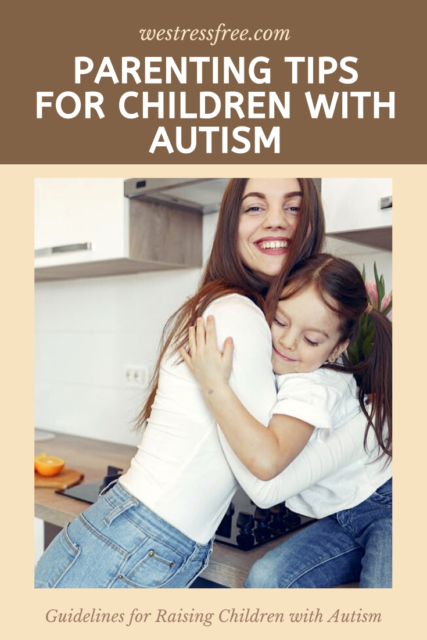PARENTING TIPS for Children with AUTISM
Children with special needs with the category of autism have neurodevelopmental disorders characterized by disturbances in social interaction, language development, and communication. The characteristics of autism vary, from the mildest to the heaviest, so these children need special attention. Children with autism have difficulty understanding what others think and feel. This makes it very difficult for them to express themselves, both with words, gestures, facial expressions, and touches. In order to help your child to a better quality of life, here are some parenting tips for children with autism.
Parenting Tips for Children with Autism – Guidelines for Raising Children with Autism
Knowing your child has autism is an experience that can distort your life as a parent and individual, as well as an active member of the community.
Autism is an invisible disease – a condition that can paralyze the sufferer but can provide no physical clues other than the difficulties involved in social interaction and communication, which are often misinterpreted as behavioral problems. Parents or caregivers of someone who has autism may have to deal with the strange scorns and stares of people who do not understand the way an autistic child acts and behaves. This kind of reaction can make patients and their families reluctant to leave the house.
However, research shows that parents of children who have autism can still get emotional and mental peace, while at the same time also having strong ties with their children. The study concluded that mothers with children with autism were five times more likely to have a close relationship with their children compared to groups of mothers with children who had other types of developmental disorders.
There is hope and help behind every difficulty. Consider the following strategies to arm you when overcoming specific challenges, and feel the joy and pride of raising a child who has autism.
First and foremost, we must stop trying to improve the child’s “disability” and start to create conditions that can help the child’s brain do a better job.
Also read: Help Children With AUTISM To OVERCOME COVID19 Quarantine
1. Learn a lot
Learning as much as you can about autism and being actively involved in treatment will be a long-term benefit for your child’s development.
Because the signs and symptoms of this chronic disease often change, treatment strategies will be designed according to the needs of the child and human resources in the family. With so many variations and types of autism treatments available, it needs to be understood that there isn’t one specific treatment that works effectively for everyone.
Every person who has autism is unique, with different strengths and weaknesses. However, in general, autistic children respond best to specific and structured treatments. Therapeutic programs that involve a combination of assistance for parents and improvement of aspects of communication skills, social, adaptation, and learning from a child will provide the best results for children.
Talk to your doctor about what treatment program is best for your child’s condition and goals for educational services so that you and your child can take advantage of all available resources.
Enrich your knowledge and other family members about autism so that you understand the symptoms and behavior, as well as the differences in alternative treatments or therapies that are possible. The main goal of treatment and therapy is to improve the quality of the child’s general skills to develop and function to meet their maximum capacity.
Always communicate your plans and ideas with a professional team and other parents who have been trapped in the same situation as you. In addition, find out and understand public policy so that you can be your child’s guardian in getting the best educational opportunities and health services.
2. Give structure and stability
Autistic children need uniformity and familiarity. They will have difficulty adapting what information they have learned in one situation (for example from the therapist’s office or school) to other different situations, including home. For example, at school, they might be accustomed to using sign language to be able to communicate but never did it at home.
Creating a consistent environment is the best way to encourage children’s learning. Find out what your child’s therapist is doing to help their condition and do the same at home.
Explore the possibility of having a therapeutic system that is carried out in various places in order to hone the child’s ability to transfer and store information he can from one place to another. Also important, be consistent in how you interact with your child and control bad behavior.
3. Design a detailed daily schedule
Autistic children tend to put out the best side when they have a daily schedule that is designed in detail over time, as well as the consistency of the types of routines they do. Again, this relates to the aspects of consistency and familiarity needed by children with special needs.
Design a child’s daily schedule with meals, baths, therapy, school, and a regular bedtime. Try to keep as little interference or changes as possible. If there are sudden changes that cannot be contested, prepare the child as early as possible.
4. Respect good behavior
Praise and appreciation for the success they achieved will be very beneficial for autistic children, so make sure you give praise every time they do something good (for example, completing a difficult therapy session or learning something new) and obey your rules. Show how good behavior leads to positive results, while as little as possible to give a negative reaction to the child’s obstinacy.
In addition, look for other alternative awards that you can show for them, such as giving a star sticker each time you finish therapy or let them play with their favorite toys.
Also read: ADHD versus Autism
5. Look for nonverbal ways to communicate
Communicating with autistic children is a challenge, but there are many other ways of communication that don’t require you to talk to your child to be able to understand it. How you look at them, touch them, and how your tone of voice and gestures when with them signifies your communication with them. Your child also communicates with you in the same way, even if they never said one word. You just need to understand the language.
If you are aware and observant, you can learn to pick up on nonverbal cues that are used by children to communicate. Pay attention to the type of sound they make, and the body movements they use when they are tired, hungry, or need something.
Like children in general, children with autism will also feel angry when they feel their intentions are misinterpreted or ignored. When autistic children start acting up, it often results from your lack of understanding of the nonverbal cues they show. Tantrums are their way of telling you they feel frustrated and want to get your attention.
6. Creative in designing personal therapy
Apart from therapeutic needs, autistic children also need to unwind and have fun as children. Schedule playtime when the child is at his best energy. Find out various effective ways to have fun together by paying attention to what things can make your child smile, laugh, and relax. Your child will be more likely to enjoy these activities if they do not seem like an obligation or therapeutic.
Many children with autism also have hypersensitivity to light, sound, touch, taste, and smell – while others can be far less sensitive to sensory stimuli. Find out what sights or images, sounds, smells, movements, other sensory sensations can trigger bad behavior or damage and anything that can cause a positive reaction on him. Also, pay attention to what makes your child stressed, calm, uncomfortable, and happy.
If you understand what can affect your child, you will be better able to solve problems, prevent situations that can trigger problems, and create a home environment that runs in harmony with the child’s development.
Finally, treating children with autism can be very tiring, both physically and mentally. You don’t need to go through this alone. You have many support groups and consulting agencies that you can turn your shoulders to lean on in difficult times. In addition, it is also important to take care of yourself – running away from routine stress.
It never hurts to pamper yourself once a week between busy caring for your child.
Stay safe, happy, and healthy!
—————————————————————————————————————————————–
This post may contain affiliate links, which means I make a small commission off purchases, at no extra cost to you. Read my full disclosure here. Thank you for supporting the work I put on this site!

—————————————————————————————————————————————–
We Stress Free does not provide medical advice, diagnosis, or treatment. However, if you need someone to talk to and want to make friends, please feel free to reach me at ferra@westressfree.com. If you would like to REDUCE your STRESS and are interested to do an ONLINE THERAPY, you can do so here.
—————————————————————————————————————————————-
Disclaimer: The information contained in this article is for educational and informational purposes only and is not intended as health or medical advice. Always consult a physician or other qualified health provider regarding any questions you may have about a medical condition or health objectives.
Thank you for reading today’s topic: PARENTING TIPS for Children with AUTISM























Every person who has autism is unique – and everyone is unique <3 <3
Hello Sima,
Yes, you’re absolutely right. Everyone is unique in our own way. 🙂
Thank you for visiting my site, reading the article and leaving a comment.
Stay safe, happy and healthy!
Ferra
Hi Ferra,
What a great post! My grandson has autism and your tips are very helpful. It’s nice to have someone provide information about something that so few understand. You’re correct in your statement that people look at you strangely when you’re out in public and your child has a meltdown. The more people that realize that the child is not simply being a brat, they have a real condition, the better it is for the child and their family.
Good luck to you!
Lisa
Hello Lisa,
Yes, that’s right. People is easy and quick to judge us parents when our child has a meltdown. They don’t know what we are struggling with when it comes to raising an autistic child.
I hope we can keep raising people’s awareness about autism and respect parents who do a good job raising their autistic child.
Thank you for your kind comment, Lisa. I really appreciate it!
Stay safe, happy and healthy!
Ferra 🙂
Hi, I have experience working with children on the autistic spectrum and I completely agree with everything you write here. Great article, thank you for sharing.
Hello,
Thank you for your kind comment. Glad you found this article useful. Hope others will find this useful as well. 🙂
Stay safe, happy and healthy!
Ferra
Ferra, thanks for your post. My little brother has down syndrome. Though it can be difficult, persons with disabilities can teach you so much and help you truly learn how to live and love.
Charles
Hello Charles,
Thank you for sharing your story. I will post my own story soon when my baby was diagnosed to be born with down syndrome.
I agree with you. We can learn so much from people with disabilities: compassion, be considerate, patience, etc.
Stay safe, happy and healthy!
Ferra
This is such a fantastic and helpful post. The useful tip that resonated with me the most is looking for non-verbal ways to communicate. Sometimes children with Autism try so hard to get their points through and we are so quick to dismiss all the non-verbal cues they give us. This is such an important part of communication that a lot of people ignore.
Hello Bulope,
Yes, that’s right. When we understand that autistic children have difficulty to get their message across, that means as adults, we need to be more sensitive to their needs and learn how to read the cues they’re giving us. They want to be loved as much as we want to be loved too.
Thank you for your comment. I really appreciate it!
Stay safe, happy and healthy!
Ferra 🙂